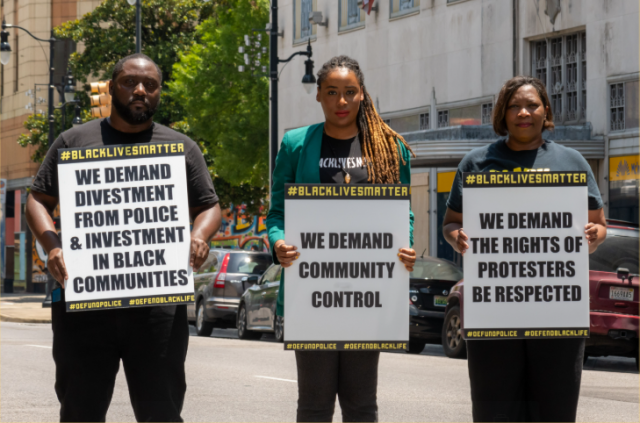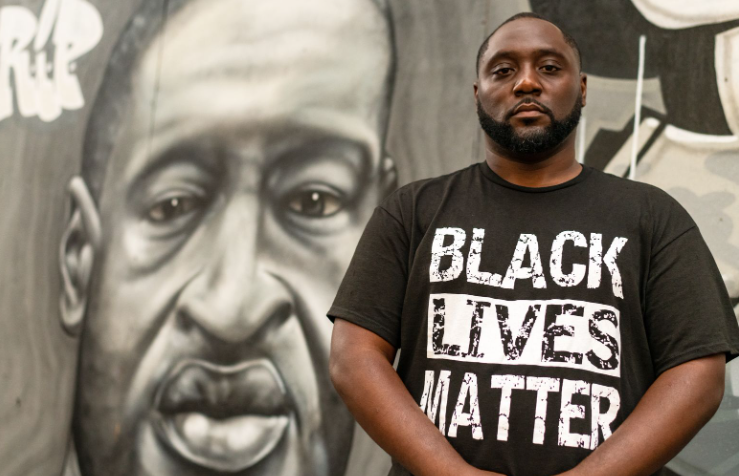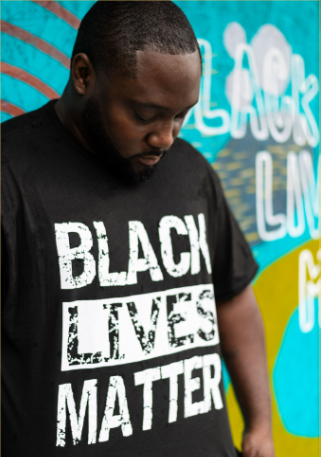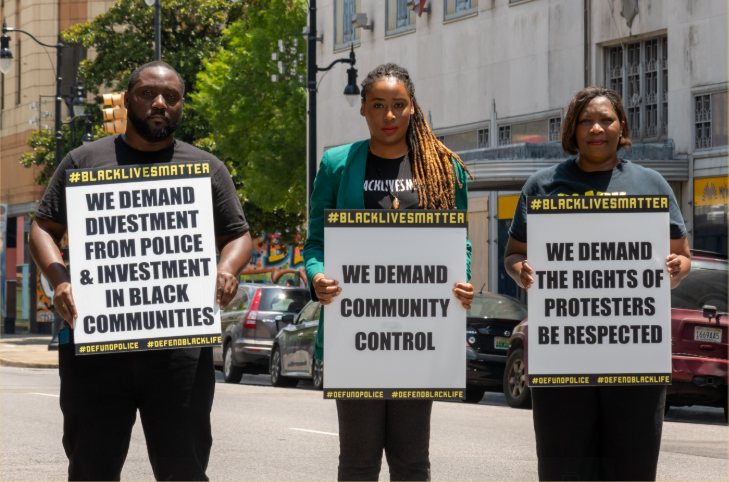
By Ameera Steward
For the Birmingham Times
(First of two parts on fight against racial injustice in Birmingham)
On a recent humid Friday afternoon, Eric Hall, Jilisa Milton, and Cara McClure did what they do best—they took to the streets of downtown Birmingham.
The gathering was not for one of the marches the trio has led or participated in as co-founders of Black Lives Matter (BLM) Birmingham. They were downtown to be photographed for a feature story on the BLM organization, which has become part of a galvanizing force for worldwide protests in the two months since the death of George Floyd, the African American man killed by police in Minneapolis, Minnesota.
Even without hundreds of demonstrators filling the streets on this holiday weekend, the BLM Birmingham leaders hear voices of support from passersby, black and white, on 3rd Avenue North outside of the Alabama Theater.
Present were Hall, 33, a former neighborhood association officer; Milton, 32, a University of Alabama graduate with degrees in law and social work; and McClure, 50, a strategist who recruited the others to establish the Magic City’s BLM chapter.
For these three activists, BLM Birmingham has become more than a rallying cry, organization, or a movement—it’s their life’s work.
“We want to affirm and uplift all Black lives,” Hall said. “People have grown tired [of racial injustice], and they are demanding for change in their communities not just on the federal level but on the local level.”
The group has already been instrumental in various causes on the local level. Last month, BLM Birmingham called on the city to dismiss inciting to riot charges against Jermaine “Funnymaine” Johnson, contending that the comedian was innocent of charges that stemmed from civil unrest in downtown Birmingham.
Charges against Johnson were dropped the following week.
When City Council President William Parker in mid-June talked of possibly renaming 16th Street North to Black Lives Matter Boulevard, McClure, Hall, and Milton signed an “Open Letter to Birmingham Leaders” in opposition to the proposal. Their names were included as part of “A Group of Movement Voices” in a letter to Parker, the Birmingham City Council, and the city of Birmingham.
In early 2017, BLM and others were outspoken against the Birmingham Violence Reduction Initiative (BVRI), a city-led effort during which police vehicles, including a SWAT truck and multiple officers in camouflage, poured into the Central Pratt community alarming some residents.
“We worked really hard to stop the [BVRI] because it that involved a very heavy surveillance component,” Milton said. “We did public campaigns against it. We sat down with officials against it. … It was very organic. … We wrote opinions.”
Across the nation and certainly in Birmingham, many, like the passersby in downtown, are voicing mounting support for the BLM movement and several of its objectives, including divestment from the police and investment in Black communities, as well as immediate relief for communities and community control.
“Unbreakable Bond”
McClure remembers the early meetings with Milton and Hall in the living room of her Birmingham apartment, “where we built an unbreakable bond,” she said.
“We were able to create a family. … We shared meals. When [Milton] needed to come to Birmingham to study, she came to my house. … [Hall] would come by, and we just took over the living room. It was a special time that I will never forget because they were like my energy.”
Milton would drive up from Tuscaloosa, where she was enrolled at the University of Alabama, and Hall would come over from the Central Pratt community in west Birmingham, where he lived and served as a neighborhood officer.
The national BLM organization began as a rallying cry in 2013, following the acquittal of George Zimmerman on second-degree murder and manslaughter charges in the killing of 17-year-old Trayvon Martin in Sanford, Florida. In February 2012, Zimmerman, then a neighborhood watchman, followed, shot, and killed the unarmed Martin during a physical altercation between the two. BLM—founded by Opal Tometi, Alicia Garza, and Patrisse Cullors—evolved into a hashtag, a movement, and an organization to advocate for nonviolent civil disobedience in protests against incidents of injustice and police brutality against African Americans.
A group was started in Birmingham but disbanded. Eventually, McClure, who was part of the original group, re-established the local chapter: “We needed one that was connected to the women who started it all,” she said, adding that she contacted Hall and Milton, as well as Martez Files, who this year founded his own group, When We Fight.
“I had been seeing [Hall] on social media speaking out about different things,” McClure said. “I also saw [Milton on Facebook] asking a question about how to join, so I went to her page, looked her up, and saw that this was somebody I would like to work with.”
McClure went from being a housewife and business owner of ASAP Apartment Locators, which helps individuals and families find their ideal homes, to a community activist and organizer in a few weeks—something that “gradually happened without me noticing,” she said.
“Captured My Attention”
McClure really embarked on her activism efforts after her then-19-year-old son said to her the day Zimmerman was acquitted, “Mom, your generation dropped the ball.”
“That captured my attention,” she recalled. “I started imagining a different world, … where my son, [Brandon McClure, now 26], could go out and not worry about being profiled by police. … I just wanted to see a different world, especially in a city that is 74 percent Black. … After listening [to news coverage of Zimmerman’s acquittal] for more than an hour, … I was in tears, and I said, ‘When I come home [from visiting Memphis, Tennessee], we can find a protest to go to.”
Her son’s words also took her back to the years 2008 through 2011, when McClure and her son were homeless in Atlanta, Georgia, sleeping on floors because she was separated from her spouse.
“I remember one night sleeping on this lady’s floor, just crying out and asking God to make me a difference maker,” she said. “I didn’t know what form that was going to take, but years later I was presented with the opportunity to actually do that.”
McClure and her son found a flyer advertising a protest being held for Martin in Birmingham on Highway 280, which she and her son attended in December 2014. Soon thereafter, activism became her life. Where she once focused on her family—being a mom and wife, making an income—she turned to putting her all into BLM.
“I felt conflicted when selling and focusing on luxury apartments,” McClure said. “I felt like, in order for me to really be in this [activism] space and really be authentic, I needed to just step away a little bit, … to learn about what was happening in the world … [related to] racial injustice, the criminal justice system, [things] I wasn’t paying attention to [before].”
How serious was McClure about activism?
She and her husband had been separated in Atlanta but divorced after her increased role with BLM because “he just couldn’t take that lifestyle anymore—me going to jail, me always inviting folks over for meetings,” she said.
“There was so much demand, and this new demand on me wasn’t generating income or generating happiness or joy,” McClure added. “I was in the house angry all the time or in tears or just wanting to watch … what was happening … in the country or watching protests all the time because … I was trying to get into my BLM role.”
McClure’s work included more than BLM. She also helped launch Showing Up for Racial Justice Birmingham, a group dedicated to community organizing, mobilizing, and education; “Black Mama’s Bail Out Day” in Birmingham, which raised money to help bail out incarcerated black mothers and help reunite them with their children and families ahead of Mother’s Day; and Faith and Works, a statewide civic engagement collective.
Held at Gunpoint
All of McClure’s community work aligned with what Milton saw as part of her mission. Milton is not only a co-founder of BLM Birmingham but also one of the people the organization was founded to protect.
While visiting home from college at University of Alabama, she and her brother were home alone. Her brother went to a neighbor’s house, and when he crossed the grass on his way back to their home, someone called the police thinking he was an intruder.
When the police arrived, they held Milton at gunpoint.
At the time of the incident, she said didn’t believe she had the power to say anything or even had the right to be enraged.
“That was something I experienced personally, but I never said anything … because I didn’t understand how to process it and what to do to get anything done about it,” said Milton.
Although she was born in New York, Milton was familiar with Birmingham; she and her four siblings were moved to the city by her grandparents when she was in first grade. They lived in College Hills and then moved to Roebuck when she was in seventh grade.
She would soon find her voice as both an activist and an attorney. Milton earned a bachelor’s degree in social work in 2012, a master’s degree in social work in 2019, and a Juris Doctor degree in 2019 from University of Alabama; she also was awarded the prestigious Equal Justice Works Fellowship to protect the rights of children with disabilities in the Black Belt.
During Milton’s first year in law school, Philando Castile, a 32-year-old Black man was fatally shot by a police officer during a traffic stop in St. Paul, Minnesota, while his partner and four-year-old daughter were in the vehicle watching. Also, in that same year Alton Sterling, a 37-year-old Black man, was shot dead by two police officers in Baton Rouge, Louisiana.
“There was something about the Philando Castile video that just reminded me of my own experience,” Milton said. “I wouldn’t say I have a trauma connection, … but there was something about that summer and me just needing to stop talking and do something.”
Milton contacted the BLM Birmingham chapter on Facebook, and the rest is history.
“I always wanted to do work related to … how to use the legal system,” she said. “I was a social worker, as well, wanting to talk about the way trauma affects people and wanting it to just stop because I felt like I had this one experience but I had to relive it all the time. I was tired of it, of having to relive the same thing I went through over and over again every few months.”
Continuous Police Shootings
McClure knew about Hall and his work within the community. He was a neighborhood officer: president of the Central Pratt Neighborhood Association; on staff with Jefferson County AIDS in Minorities Inc.; a candidate for Birmingham City Council, which he ran for unsuccessfully in 2013. But protests during the Trayvon Martin era strengthened Hall’s fight against racial injustice.
“After the killings of Martin and Tamir Rice, [a 12-year-old carrying a toy gun who was shot and killed by a police officer in Cleveland, Ohio], I thought that by now, at this point, years later, we would have come up with a system that works, that we wouldn’t be dealing with continuous police shootings, that we would call for policy change and maybe get those wins, and that was probably going to be it,” he said. “Unfortunately, Black [people] kept being killed by police. Even though we would take moments or breaks, as soon as it would happen again, we would find ourselves being called to the forefront to address these issues all over again.”
The second of two parts—in the Thursday, July 16, edition of The Birmingham Times and online —will feature some local activists whose mission is to create an inclusive, socially-just community and ensure that Black lives matter.















